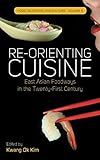Re-orienting Cuisine : East Asian Foodways in the Twenty-First Century / ed. by Kwang Ok Kim.
Material type: TextSeries: Food, Nutrition, and Culture ; 3Publisher: New York ; Oxford : Berghahn Books, [2015]Copyright date: ©2015Description: 1 online resource (310 p.)Content type:
TextSeries: Food, Nutrition, and Culture ; 3Publisher: New York ; Oxford : Berghahn Books, [2015]Copyright date: ©2015Description: 1 online resource (310 p.)Content type: - 9781782385622
- 9781782385639
- Anthropological linguistics -- Research -- Methodology
- Diet -- East Asia
- Food habits -- Research -- Methodology
- Food habits -- East Asia
- Nutritional anthropology -- Research -- Methodology
- SOCIAL SCIENCE / Agriculture & Food (see also POLITICAL SCIENCE / Public Policy / Agriculture & Food Policy)
- Anthropology (General), Food & Nutrition
- 394.12 23/eng
- GN407 .F6595 2017
- GT2853.E18
- online - DeGruyter
| Item type | Current library | Call number | URL | Status | Notes | Barcode | |
|---|---|---|---|---|---|---|---|
 eBook
eBook
|
Biblioteca "Angelicum" Pont. Univ. S.Tommaso d'Aquino Nuvola online | online - DeGruyter (Browse shelf(Opens below)) | Online access | Not for loan (Accesso limitato) | Accesso per gli utenti autorizzati / Access for authorized users | (dgr)9781782385639 |
Frontmatter -- Contents -- Figures and Tables -- Acknowledgments -- Introduction -- Part I. National/Local Food in the (Re)Making -- Chapter 1. Dining Elegance and Authenticity: Archaeology of Royal Court Cuisine in Korea -- Chapter 2. History and Politics of National Cuisine: Malaysia and Taiwan -- Chapter 3. Wudang Daoist Tea Culture -- Chapter 4. Rice Cuisine and Cultural Practice in Contemporary Korean Dietary Life -- Part II. Food Practice across Cultural Boundaries -- Chapter 5. Noodle Odyssey: East Asia and Beyond -- Chapter 6. Cultural Nostalgia and Global Imagination: Japanese Cuisine in Taiwan -- Chapter 7. The Visible and the Invisible: Intimate Engagements with Russia’s Culinary East -- Chapter 8. Experiencing the “West” through the “East” in the Margins of Europe: Chinese Food Consumption Practices in Postsocialist Bulgaria -- Chapter 9. Exoticizing the Familiar, Domesticating the Foreign: Ethnic Food Restaurants in Korea -- Chapter 10. Serving Ambiguity: Class and Classification in Thai Food at Home and Abroad -- Part III. Health, Safety, and Food Consumption -- Chapter 11. Well-Being Discourse and Chinese Food in Korean Society -- Chapter 12. The Social Life of American Crayfish in Asia -- Chapter 13. Eating Green: Ecological Food Consumption in Urban China -- Chapter 14. From Food Poisoning to Poisonous Food: The Spectrum of Food-Safety Problems in Contemporary China -- Contributors -- Index
restricted access online access with authorization star
http://purl.org/coar/access_right/c_16ec
Foods are changed not only by those who produce and supply them, but also by those who consume them. Analyzing food without considering changes over time and across space is less meaningful than analyzing it in a global context where tastes, lifestyles, and imaginations cross boundaries and blend with each other, challenging the idea of authenticity. A dish that originated in Beijing and is recreated in New York is not necessarily the same, because although authenticity is often claimed, the form, ingredients, or taste may have changed. The contributors of this volume have expanded the discussion of food to include its social and cultural meanings and functions, thereby using it as a way to explain a culture and its changes.
Mode of access: Internet via World Wide Web.
In English.
Description based on online resource; title from PDF title page (publisher's Web site, viewed 25. Jun 2024)


